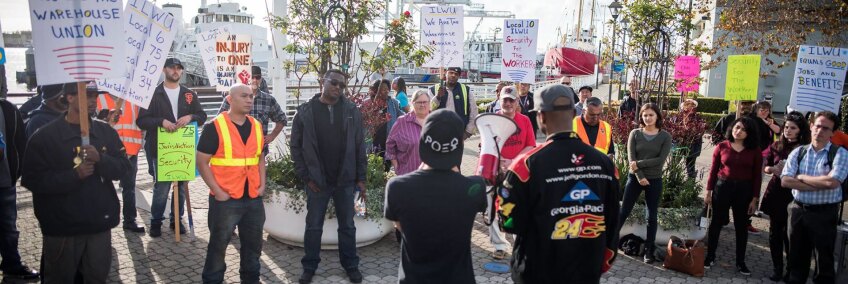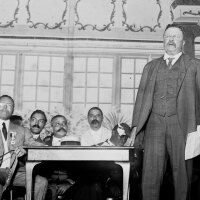Oakland Organizers Promote Economic Justice for City's Most Vulnerable Workers

The construction cranes stretching out over downtown Oakland are visible from the entrance of Taylor Memorial United Methodist Church. For the ten faith and community leaders gathered inside the West Oakland church, they’re a daily reminder of what the group is up against.
“There are more cranes up right now than we’ve seen in decades,” said Jahmese Myres, deputy director of the East Bay Alliance for a Sustainable Economy (EBASE), an Oakland-based nonprofit that convenes community leaders, labor unions and faith leaders around policies that promote economic justice. “Some folks would say that’s progress. But we’re all asking ourselves, ‘Is it equitable progress?’ And most of the time the answer is no.”
A surge of new residents is driving a housing boom in the city, which has seen its population grow by an estimated 9 percent over the last seven years. Proximity to San Francisco and Silicon Valley, a diverse citizenry and a rich food and art scene are just some of the things attracting people to Oakland. Another is its inclusion in recent years on nearly every list of “best places to visit,” which is driving tourism to a city that was once considered one of the most dangerous in the country.
All of this has had a profound impact on Oakland’s economy. Between 2010 and 2017, median household income in Oakland increased by almost 30 percent, as wealthier residents — mostly those fleeing San Francisco’s increasingly unaffordable housing market — moved in. Housing prices in Oakland during the same time period more than doubled. And as housing prices have gone up, poor residents have been forced out.
"Oakland is just bleeding Black folks."
That’s especially true for the city’s Black population. More than 8,000 of Oakland’s Black residents have left the city since 2010 in search of more affordable housing. “This is the home of the Black Panthers,” said Myres. “It had one of the highest populations of Black folks in a city setting anywhere in the country. There’s this legacy of rich black culture. That has dwindled away over the last 20 years…Oakland is just bleeding Black folks.”

The group gathered around the table at Taylor Memorial is working to change that. They’re part of the Faith Alliance for a Moral Economy, a coalition of Black clergy and faith-leaders coordinated by EBASE to champion policies that benefit low-income workers, immigrants and people of color. Today, they’re updating each other on their respective projects and planning for the months ahead.
This is one of several coalitions that EBASE convenes to combat the impact of gentrification on Oakland’s most marginalized communities. Among the topics being discussed is how to build on a recent victory at the Port of Oakland, which has been the focus of development efforts ever since a large army base was decommissioned there in 1999.

Control of the site is shared by the Port of Oakland and the City of Oakland, two separate but related entities. In 2012, a coalition of 30 organizations assembled by EBASE known as Revive Oakland! secured a landmark deal to ensure that development projects on the city-owned portion of the site benefit local workers. Among other things, the deal ensures living wages, benefits, limitations on the use of temporary workers and priority hiring for local, historically disenfranchised populations — people who are unemployed, army veterans, single parents, formerly incarcerated people and adults who have aged out of the foster care system.
Last year, the coalition reached a deal with port authorities that goes even further. Most notably, the operators of a planned new logistics facility will implement what EBASE calls one of the strongest “ban the box” policies — policies that ban questions about prior criminal offenses — in the nation. Among other things, the group at Taylor Memorial is strategizing about how to expand that policy beyond the site of the former army base to all redevelopment on the port, including the proposed site of the new Oakland A’s stadium.

Another of EBASE’s priorities this year is the implementation of Measure Z, which the organization helped pass last fall in partnership with UNITE HERE! Local 2850, a local union representing hospitality and food service workers. The measure raises the minimum wage for hotel workers, puts limits on workload and gives them additional protections, which are needed in an industry where sexual harassment is common. “It provides every hotel housekeeper with a panic button,” said Myres. “In case there is threat of sexual assault, they can ring the button and it will automatically contact management so they can get out of the situation safely.” EBASE is working to ensure that hotel workers know about their rights under the new measure and that it’s being adequately enforced.
"Not any job is a good job. If it’s a job that exploits you, that puts you in an unsafe precarious position, that doesn’t pay you enough to keep up with rising rent, then that’s not a good job.”
Looking ahead, Myres is hopeful that Oakland can grow its economy without displacing its most vulnerable residents, in part because the newly elected city council is decidedly more progressive than the last (among its new members is EBASE’s former executive director). But she is clear-eyed about the challenges. “There’s this long-standing narrative that, ‘Well, any job is a good job and we’ve just got to take what we can get.’” said Myres. “Oakland has held that mentality for a long time. But not any job is a good job. If it’s a job that exploits you, that puts you in an unsafe precarious position, that doesn’t pay you enough to keep up with rising rent, then that’s not a good job.”
EBASE’s coalition of organizers is chipping away at that narrative and building another one that’s about holding onto the people that have made Oakland the vibrant, diverse, culturally rich place that it is. If it succeeds, maybe the cranes that dot the city’s skyline will symbolize more than just a housing boom.







